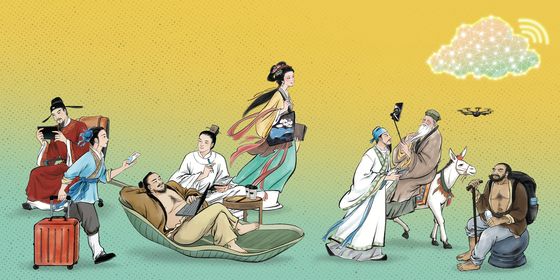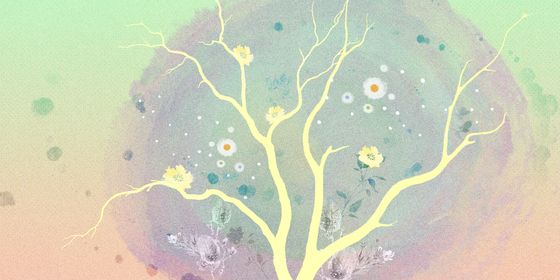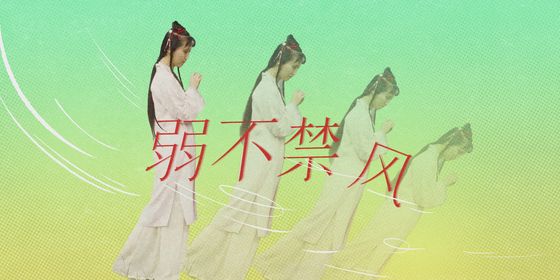Mid-Autumn sayings about the moon
Choice Chengyu is a regular column, examining interesting, unique or newsworthy examples of chengyu—four-character idioms or proverbs, derived from historical and mythical events.
Held on the 15th day of the eighth lunar month, the Mid-Autumn Festival is one of the most important Chinese festivals. On this day, people reunite with their families, eat mooncake, and appreciate the full moon together. In Chinese culture, the moon has a lot of symbolic meanings, and was often associated with homesickness, romance, and nostalgia in literature. Many of these lunar allusions have since become chengyu:
众星捧月 Myriad stars surround the moon
This is a metaphor for people clustering around someone whom they respect or admire:
It gave him much satisfaction to be surrounded by admirers, like stars crowding around the moon.
Bèi zhème duō chóngbàizhě zhòngxīngpěngyuè yíyàng de cùyōng zhe, tā gǎndào shífēn mǎnzú.
被这么多崇拜者众星捧月一样地簇拥着,他感到十分满足。
月满则亏,水满则溢 The full moon wanes, and a full basin overflows
Influenced by the “golden mean” principle (中庸之道) of Confucianism, Chinese people have traditionally appreciated moderation in all things. This idiom, originating from the Book of Changes, implies that once something reach a certain extreme, it will develop in the opposite direction. It’s often used to warn people that nothing good lasts forever:
The full moon wanes, and water overflows. Nothing stays prosperous forever.
Yuèmǎn zé kuī, shuǐ mǎn zé yì. Méiyǒu shénme néng chángshèng bù shuāi.
月满则亏,水满则溢。没有什么能长盛不衰。
风花雪月 Wind, flowers, snow, and moon
Many chengyu reference both the moon and flowers, each has a different meaning. Some moon-and-flower chengyu are associated with romance. This one used to be a shorthand for classical literature, which often depicted nature themes, and for effete and sentimental writing in general. Now, it implies a romantic relationship:
She is too busy to have time for love.
Tā tài máng le, méi shíjiān qù kǎolǜ nàxiē fēnghuāxuěyuè de shì.
她太忙了,没时间去考虑那些风花雪月的事。
花前月下 Among flowers and under the moon
This chengyu also refers to love affairs, as it describes an ideal location for romancing couples:
He spent all his time on love affairs, and didn’t prepare for the exam at all.
Tā guāng gùzhe huāqián yuèxià qùle, gēnběn méiyǒu zhǔnbèi kǎoshì.
他光顾着花前月下去了,根本没有准备考试。
花容月貌 The face of a flower and the appearance of a moon
Some chengyu invoke the moon and flowers to descibe stunning beauty:
I fell in love at the first sight of her breathtaking beauty.
Tā de huāróng yuèmào jiào wǒ yíjiàn qīngxīn.
她的花容月貌叫我一见倾心。
闭月羞花 Outshining the moon and putting flowers to shame
Sometimes, a woman is so beautiful that people don’t even feel that flowers or the moon deserve to be compared with her, hence this chengyu. The phrase “outshines the moon” is usually associated with the Three Kingdoms beauty Diao Chan, while “puts the flowers to shame” described Concubine Yang of the Tang dynasty, both of whom were among ancient China’s “four great beauties.”
镜花水月 Flowers in a mirror and the moon in water
Flowers and the moon can also invoke philosophical musings. This chengyu originally referred to elusive images or moods in poetry, but now describes a beautiful illusion.
Looking back, the glory and wealth of the past were just flower in a mirror or the moon in water.
Xīànzài xiǎnglái, nàxiē rónghuá fùguì búguò shì jìnghuā shuǐyuè.
现在想来,那些荣华富贵不过是镜花水月。
花好月圆 Blooming flowers and a full moon
This phrase uses flowers and the moon to express contentment and happiness. It is mostly used as a complimentary wish for newly wed couples.
Cover image from VCG












